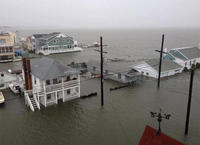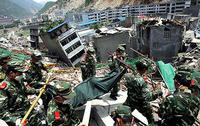-
Fracking in Michigan
In hydraulic fracturing, large amounts of water, sand and chemicals are injected deep underground to break apart rock and free trapped natural gas; though the process has been used for decades, recent technical advances have helped unlock vast stores of previously inaccessible natural gas, resulting in a fracking boom; researchers are examining the benefits of fracking for Michigan
-
-
Post-Sandy insurance rates increase may make coastal living unaffordable

Residents of New York and New Jersey are still coping with the destruction Hurricane Sandy caused, but home and business owners alike will soon face another burden: rising insurance rates and new building codes and requirements that could threaten many that live and work in the coastal areas of the two states
-
-
Lloyd’s says countries are under insured against natural disasters

Lloyd’s of London, the world’s largest insurance company, has warned seventeen countries that a $165 billion global insurance deficit leaves them vulnerable to long-term natural disaster costs; Lloyds says the world may not be able to afford another year like 2011, when natural disasters such as the earthquake and tsunami in Japan and the floods in Thailand caused $4.6 trillion dollars of damage to infrastructure, homes, and businesses, and which resulted in the largest disaster claims ever
-
-
The debate over radon as an earthquake predictor continues
Scientists have been interested in using radon emissions to predict earthquakes since the 1980s, but no solid evidence ever came to support it and the idea was abandoned by most in the field during the 1990s; now, scientists are looking again at radon as an earthquake predictor
-
-
Hard choices to be made on adapting infrastructure to climate change
The costs of adapting to climate change, sea-level, and flooding include the upfront expenses of upgrading infrastructure, installing early-warning systems, and effective organizations, as well as the costs of reducing risk, such as not building on flood plains
-
-
Scientists identify a human-caused climate change signal in the noise
By comparing simulations from twenty different computer models to satellite observations, Lawrence Livermore climate scientists and colleagues from sixteen other organizations have found that tropospheric and stratospheric temperature changes are clearly related to human activities; “No known mode of natural climate variability can cause sustained, global-scale warming of the troposphere and cooling of the lower stratosphere,” says Livernore atmospheric scientist Benjamin Santer
-
-
Innovative method to capture CO2
The carbonate-looping method for capturing carbon dioxide (CO2) could reduce power-plant CO2 emissions by more than 90 percent, while utilizing less energy and incurring less expense than former approaches
-
-
Detection aircraft surveys 600 miles of PG&E California pipeline for gas leaks
PG&E’s transmission pipeline is routinely surveyed each year, typically by ground crews; accessing rural areas with difficult terrain, however, can be time consuming, expensive, and unsafe for crews on the ground; aerial surveys often look for dead vegetation as an indicator of gas leaks
-
-
Sea-levels rising faster than IPCC projections
Sea-levels are rising 60 percent faster than the Intergovernmental Panel on Climate Change’s (IPCC) central projections, new research suggests; the study involved an analysis of global temperatures and sea-level data over the past two decades, comparing them both to projections made in the IPCC’s third and fourth assessment reports
-
-
Synthetic fuels could entirely eliminate U.S. need for crude oil, create new economy

The United States could eliminate the need for crude oil by using a combination of coal, natural gas, and non-food crops to make synthetic fuel, a team of researchers has found; besides economic and national security benefits, the plan has potential environmental advantages; because plants absorb carbon dioxide to grow, the United States could cut vehicle greenhouse emissions by as much as 50 percent in the next several decades using non-food crops to create liquid fuels
-
-
Engineers awarded $2.2 million grant for research on new toilet design
A University of Toronto engineering team has received a major grant from the Bill and Melinda Gates Foundation to continue work on designing for a waterless, hygienic toilet that is safe and affordable for people in the developing world
-
-
“Intra-seasonal” variability in sea-level change
The effects of storm surge and sea-level rise have become topics of everyday conversation in the days and weeks following Hurricane Sandy’s catastrophic landfall along the mid-Atlantic coast; new research is throwing light on another, less-familiar component of sea-level variability — the “intra-seasonal” changes that occupy the middle ground between rapid, storm-related surges in sea level and the long-term increase in sea level due to global climate change
-
-
American West's changing climate means economic changes, too
The State of the West Symposium, hosted by the Bill Lane Center for the American West and the Stanford Institute for Economic Policy Research, featured a discussion of the Western United States’ future of extreme heat, declining snowpack, and what it all means for the region’s industry, electricity generation, and policy
-
-
Technology to help weather bushfires, floods and more
Natural disasters have increased in severity and frequency in recent years; in 2010, 385 natural disasters affected 217 million people worldwide at a cost to the global economy of $123.9 billion; there is an on-going research into digital technologies and services for disaster planning, preparation, rescue, and recovery; these technologies can help emergency services better manage natural disasters and minimize their effects on people, infrastructure, and the environment
-
-
Blame, responsibility, and demand for change following floods
New research shows concerns about governmental failure to act effectively and fairly in the aftermath of extreme weather events can affect the degree to which residents are willing to protect themselves; the findings could prove key to establishing how society should evolve to cope with more turbulent weather and more frequent mega storms
-
- All
- Regional
- Water
- Biometrics
- Borders/Immig
- Business
- Cybersecurity
- Detection
- Disasters
- Government
- Infrastructure
- International
- Public health
- Public Safety
- Communication interoperabillity
- Emergency services
- Emergency medical services
- Fire
- First response
- IEDs
- Law Enforcement
- Law Enforcement Technology
- Military technology
- Nonlethal weapons
- Nuclear weapons
- Personal protection equipment
- Police
- Notification /alert systems
- Situational awareness
- Weapons systems
- Sci-Tech
- Sector Reports
- Surveillance
- Transportation
Advertising & Marketing: advertise@newswirepubs.com
Editorial: editor@newswirepubs.com
General: info@newswirepubs.com
2010-2011 © News Wire Publications, LLC News Wire Publications, LLC
220 Old Country Road | Suite 200 | Mineola | New York | 11501
Permissions and Policies
Editorial: editor@newswirepubs.com
General: info@newswirepubs.com
2010-2011 © News Wire Publications, LLC News Wire Publications, LLC
220 Old Country Road | Suite 200 | Mineola | New York | 11501
Permissions and Policies
